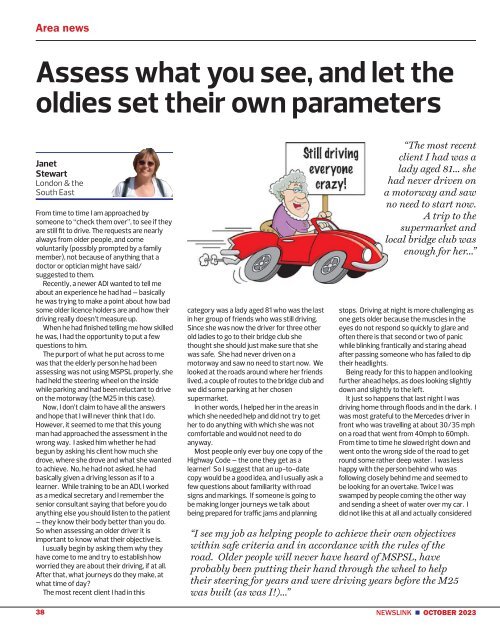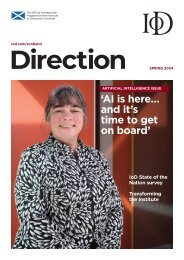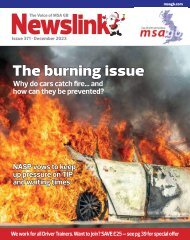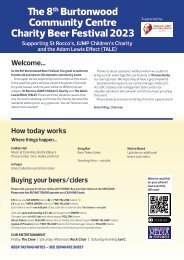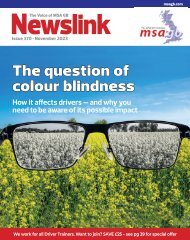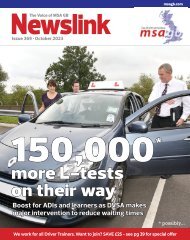Newslink October Marketing Special
Marketing issue of Newslink October, Motor Schools Association, driver training and testing, road safety
Marketing issue of Newslink October, Motor Schools Association, driver training and testing, road safety
Create successful ePaper yourself
Turn your PDF publications into a flip-book with our unique Google optimized e-Paper software.
Area news<br />
Assess what you see, and let the<br />
oldies set their own parameters<br />
Janet<br />
Stewart<br />
London & the<br />
South East<br />
From time to time I am approached by<br />
someone to “check them over”, to see if they<br />
are still fit to drive. The requests are nearly<br />
always from older people, and come<br />
voluntarily (possibly prompted by a family<br />
member), not because of anything that a<br />
doctor or optician might have said/<br />
suggested to them.<br />
Recently, a newer ADI wanted to tell me<br />
about an experience he had had – basically<br />
he was trying to make a point about how bad<br />
some older licence holders are and how their<br />
driving really doesn’t measure up.<br />
When he had finished telling me how skilled<br />
he was, I had the opportunity to put a few<br />
questions to him.<br />
The purport of what he put across to me<br />
was that the elderly person he had been<br />
assessing was not using MSPSL properly, she<br />
had held the steering wheel on the inside<br />
while parking and had been reluctant to drive<br />
on the motorway (the M25 in this case).<br />
Now, I don’t claim to have all the answers<br />
and hope that I will never think that I do.<br />
However, it seemed to me that this young<br />
man had approached the assessment in the<br />
wrong way. I asked him whether he had<br />
begun by asking his client how much she<br />
drove, where she drove and what she wanted<br />
to achieve. No, he had not asked, he had<br />
basically given a driving lesson as if to a<br />
learner. While training to be an ADI, I worked<br />
as a medical secretary and I remember the<br />
senior consultant saying that before you do<br />
anything else you should listen to the patient<br />
– they know their body better than you do.<br />
So when assessing an older driver it is<br />
important to know what their objective is.<br />
I usually begin by asking them why they<br />
have come to me and try to establish how<br />
worried they are about their driving, if at all.<br />
After that, what journeys do they make, at<br />
what time of day?<br />
The most recent client I had in this<br />
category was a lady aged 81 who was the last<br />
in her group of friends who was still driving.<br />
Since she was now the driver for three other<br />
old ladies to go to their bridge club she<br />
thought she should just make sure that she<br />
was safe. She had never driven on a<br />
motorway and saw no need to start now. We<br />
looked at the roads around where her friends<br />
lived, a couple of routes to the bridge club and<br />
we did some parking at her chosen<br />
supermarket.<br />
In other words, I helped her in the areas in<br />
which she needed help and did not try to get<br />
her to do anything with which she was not<br />
comfortable and would not need to do<br />
anyway.<br />
Most people only ever buy one copy of the<br />
Highway Code – the one they get as a<br />
learner! So I suggest that an up-to-date<br />
copy would be a good idea, and I usually ask a<br />
few questions about familiarity with road<br />
signs and markings. If someone is going to<br />
be making longer journeys we talk about<br />
being prepared for traffic jams and planning<br />
“The most recent<br />
client I had was a<br />
lady aged 81... she<br />
had never driven on<br />
a motorway and saw<br />
no need to start now.<br />
A trip to the<br />
supermarket and<br />
local bridge club was<br />
enough for her...”<br />
stops. Driving at night is more challenging as<br />
one gets older because the muscles in the<br />
eyes do not respond so quickly to glare and<br />
often there is that second or two of panic<br />
while blinking frantically and staring ahead<br />
after passing someone who has failed to dip<br />
their headlights.<br />
Being ready for this to happen and looking<br />
further ahead helps, as does looking slightly<br />
down and slightly to the left.<br />
It just so happens that last night I was<br />
driving home through floods and in the dark. I<br />
was most grateful to the Mercedes driver in<br />
front who was travelling at about 30/35 mph<br />
on a road that went from 40mph to 60mph.<br />
From time to time he slowed right down and<br />
went onto the wrong side of the road to get<br />
round some rather deep water. I was less<br />
happy with the person behind who was<br />
following closely behind me and seemed to<br />
be looking for an overtake. Twice I was<br />
swamped by people coming the other way<br />
and sending a sheet of water over my car. I<br />
did not like this at all and actually considered<br />
“I see my job as helping people to achieve their own objectives<br />
within safe criteria and in accordance with the rules of the<br />
road. Older people will never have heard of MSPSL, have<br />
probably been putting their hand through the wheel to help<br />
their steering for years and were driving years before the M25<br />
was built (as was I!)...”<br />
38 NEWSLINK n OCTOBER 2023


